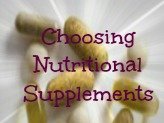Vital Nutrients to Maintain Maximum Health
The vital nutrients that the human body requires are protein, carbohydrates, fat, vitamins, minerals, and water. The first three are referred to as “fuel nutrients” because they are the only substances the body uses to supply energy needed for work and normal functions.
The three others (minerals, vitamins, and water) are regulatory nutrients. These have no caloric value like the first three, but still are necessary for a person to function normally and maintain good health. A calorie is the unit of measure indication the energy value of food to the person who consumes it.
Many nutritionists add a seventh nutrient to this list- fiber. Fiber is a form of complex carbohydrate and has received a great deal of attention recently. A high fiber diet gives a person a feeling of fullness without adding too many calories to the diet.
Recommended amounts of nutrients appear to provide protection against several diseases, including cancer and cardiovascular disease.
Carbohydrates, fats, proteins, and water are termed as macronutrients because we need them in proportionately large amounts daily. Vitamins and minerals are required in small amounts hence they are called micronutrients.
Depending on the amount of nutrients and calories value they contain, foods can be classified by their nutrient density. Foods that contain few or moderate number of calories but are packed with nutrients are said to have high nutrient density. Foods that have a lot of calories but few nutrients are of low nutrient density and are normally called junk food.
Nutrient requirements for the body normally can be met by consuming as few as 1,200 calories per day, as long as the diet contains all the essential nutrients that the body needs. Nutrient supplementation is another option that many people are using nowadays to complement their diets. People with nutrient deficiency can greatly benefit from supplementation.
Scientific evidence has long linked poor dietary habits to early diseases. Do not wait for a major health breakdown; avoid nutrition-related problems by eating healthy foods that are rich in all the vital nutrients.
4 Vital Nutrients Missing in Many Diets
Nowadays, we do not eat as well as people did 30 years ago and many of us are starved of essential nutrients and don't even realize it. Today's fast paced lifestyle makes it more convenient to get a fast food meal which is depleted of many essential nutrients.
Our daily diets are woefully lacking in fruits and vegetables which provide us with vitamins, minerals, enzymes and fiber that help the immune system to fight off illness and disease. And when we do eat fruits and vegetables chances are they are full of pesticides and chemicals. No wonder our health on the whole is declining!
Below are some vital nutrients that might be missing from your daily diets;
- Calcium
Calcium helps in building and maintaining healthy teeth and bones. It prevents bone thinning osteoporosis and also contributes to healthy blood pressure. Recent studies have shown that calcium can reduce the risk of colon cancer. A daily intake of low-fat or fat-free milk daily can give you enough calcium that your body requires. Fat-free yogurt and low-fat cheese are good sources as well.
- Vitamin C
Vitamin C is vital for creation of collagen, which is basically the glue that holds our skin, bones and blood vessels together. It also helps in neutralizing damage from free radicals, making brain chemicals, and metabolizing cholesterol. It has also been proven to help reduce heart disease, arthritis, and diabetes. To have enough of this vitamin, drink a glass of orange juice or eat an orange daily. Other foods that contain vitamin C are strawberries, kiwifruit, red bell peppers, cantaloupe, Brussels sprouts, and broccoli.
- Vitamin A
This nutrient works to give us healthy eyes as well as helps to maintain the linings of the intestinal, respiratory, and urinary tracts. It keeps our skin healthy as well. To get more vitamin A in your diet, eat darkly-pigmented foods such as spinach, carrots, winter squash, kale, and sweet potato.
- Fiber
Fiber is the part of vegetables, fruits and whole grains that is not digested. Physicians recommend that you get 14g of fiber for every 1000 calories you eat. To get more fiber in your diet, switch to whole grain bread and eat lots of fruits and vegetables with your meals. Whole grains can lower your heart disease risk by 30 percent.








New! Comments
Have your say about what you just read! Leave me a comment in the box below.